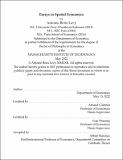Essays in Spatial Economics
Author(s)
Levy, Antoine Boris
DownloadThesis PDF (9.820Mb)
Advisor
Costinot, Arnaud
Werning, Ivan
Terms of use
Metadata
Show full item recordAbstract
This thesis is composed of three essays, showing how nationwide economic causes exert distinct local and aggregate effects across regions, depending on the geographic distribution of exposure to these common shocks, and on spatial interactions between locations.
The first chapter, building upon administrative data covering the universe of dwellings in France, documents the presence of home bias in investment (a negative effect of distance for individual investors' lumpy portfolio allocation decisions). I explore its consequences for the equilibrium supply of housing, in a spatial equilibrium framework combined with a frictional portfolio choice. Using quasi-experimental evidence from a location-specific French investment tax credit targeted at individual landlords, I evidence a substantial causal impact on transactions, new construction, investor returns, and inwards migration. Long-distance individual investor involvement rises in treated cities, and the policy has stronger effects in locations more open to outside capital.
The second chapter, in collaboration with Jacob Moscona, studies how exogenous differences in local population density lead regions to specialize in different kind of manufacturing industries. We show theoretically and empirically that a country's economic geography -- in particular, the distribution of population across space -- is an important source of comparative advantage, as countries with higher population-weighted population density specialize in sectors that benefit from agglomeration. After estimating substantial variation within the US in the extent to which manufacturing sectors sort into dense locations, we find that countries with higher population-weighted density disproportionately export in sectors with high "density affinity".
The third chapter explores electoral behavioral with regionally differentiated exposure to common campaign pledges. Using quasi-random spatial variation across municipalities, and an instrumental variables strategy exploiting formulaic real estate assessments established in the 1970s, I show that a promise to repeal a broad-based housing tax accounted for a substantial share of Emmanuel Macron's electoral success in the 2017 French presidential election. In high-frequency data, the timing of the promise coincided with a significant increase in voter information search, in Macron's polling intentions, and in his market-based predicted chances of victory. The results evidence the crucial role of spatial distributive policies, even in elections marked by ideological polarization around non-economic issues.
Date issued
2022-05Department
Massachusetts Institute of Technology. Department of EconomicsPublisher
Massachusetts Institute of Technology